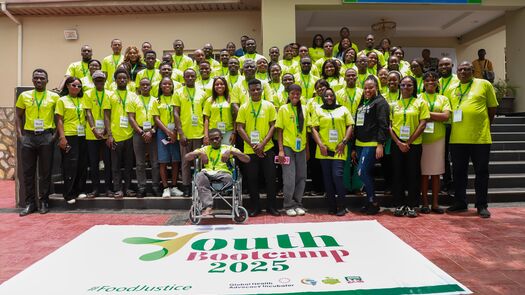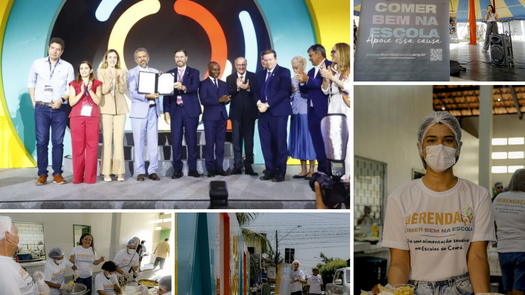November 25, 2025
 Brazil is on a path to eliminating industrially produced trans fats from its food supply ahead of the World Health Organization’s recommended 2023 deadline. The country approved regulations in December 2019 that will cap trans fat at 2% of total fat in refined vegetable oils and foods by July 1, 2021. Partially hydrogenated oils, the leading source of dietary trans fat intake, will be banned from January 1, 2023.
Brazil is on a path to eliminating industrially produced trans fats from its food supply ahead of the World Health Organization’s recommended 2023 deadline. The country approved regulations in December 2019 that will cap trans fat at 2% of total fat in refined vegetable oils and foods by July 1, 2021. Partially hydrogenated oils, the leading source of dietary trans fat intake, will be banned from January 1, 2023.
A multifaceted education and advocacy campaign led by nutritionists helped to bolster the case for policy change. The campaign was spearheaded by the Brazilian Association of Nutrition (Asbran) and Federal Council of Nutritionists (CFN) with support from the Global Health Advocacy Incubator (GHAI), a member of the Resolve to Save Lives (RTSL) initiative.
“This is a huge victory for public health in Brazil and around the world,” said Patricia Sosa, who oversaw GHAI’s efforts in Brazil. “Brazil’s nutritionists rose to the occasion, and we hope their work will inspire others across the region and around the world to advocate for policy change.”
Brazil has long been known for its progressive approach to food policy. And yet, while several companies signed onto the Pan American Health Organization’s Trans Fat Free Americas declaration in June 2008, Brazil did not pursue large-scale, population-based solutions at the time, merely asking the Brazilian Association of Food Industries to commit to reducing trans fat to 5% of total fats in processed foods and 2% of the total fats in oils and margarines.
In May 2018, WHO called for the global elimination of industrially produced trans fat, and lawmakers took note. Some of the proposals that began to circulate, however, were seen by health advocates as doing more harm than good: One legislative proposal that was in line with WHO-endorsed best practices passed the Federal Senate but was then amended in the House of Deputies by food industry allies; the amended version would install a 5% trans fat limit on processed foods while barring the country’s regulatory agency, Anvisa, from lowering that limit any further to meet international best practices.
Anvisa, meanwhile, had expressed interest in taking a firm stand on trans fat. After careful political mapping, Asbran and CFN set out to support Anvisa by creating an environment conducive to regulatory change. GHAI’s team of experienced researchers, legal experts and advocates provided strategic and technical support throughout this campaign.
Asbran and CFN engaged with Felipe Carreras and other influential lawmakers, and participated in a congressional public hearing on trans fat. The event in June 12, 2019, strengthened the case for Anvisa’s regulatory action. It also drew considerable media attention and helped Asbran to cultivate well-placed media allies that have continued to produce favorable news coverage on the campaign’s cause ever since.
As Anvisa began to draft regulatory language, Asbran and CFN created momentum for policy change by building consensus among leading public health and consumer protection organizations in Brazil on a proposal that mirrored WHO recommendations. Asbran and CFN created a well-functioning coalition of advocates, engaged political decision-makers directly, and leveraged media to create a sense of urgency around the need for policy change. Every step of the way, Asbran and CFN tracked and neutralized opposition messages and tactics.
On July 29, 2019, Anvisa launched a public consultation on trans fat. This crucial phase of the policymaking process would allow the agency to gauge public support for policy change, and gather technical input. Asbran and CFN embarked on a nationwide tour to mobilize nutritionists, as well as other advocates and concerned citizens, to take action. The organization and its coalition partners participated in more than two dozen events around the country, and launched a massive email and social media campaign that reached tens of thousands of people. All told, Anvisa received 1,220 public comments, 97% in favor of the agency’s trans fat proposal. GHAI and RTSL were among the international institutions that submitted comments.
After incorporating public feedback, Anvisa finalized and approved regulatory language on December 17, 2019.
“This is an extraordinary victory for public health,” said Ana Flávia de Rezende Gomes, Asbran’s project lead. “We are grateful to GHAI and Resolve to Save Lives for supporting our campaign every step of the way.”
GHAI will continue to work with Asbran and CFN and others to support implementation, and to share lessons learned in Brazil with other countries in Latin America and beyond.



